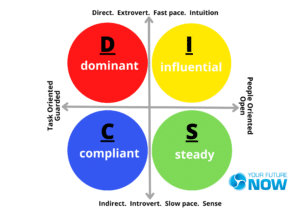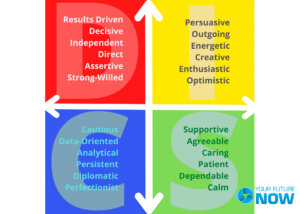

What is the most common DISC personality type?
Table of Contents
What is Personality Testing?
Personality testing, profiling or psychometric testing is a way to assess and compare your personality types to the general population so you know where you fit, what patterns you are likely to follow and the best ways to interact with other people.
Using the platforms available, you can explore your core personality traits as well as your work strengths and preferences.
With the DISC Personality Profile, it works really well in assessing workplace behaviour and patterns so you can identify certain workplace motives and patterns you might have been running without even knowing it. Understanding your DISC personality type can also help you find the root cause of office conflicts and clashes. It’s really common for different personality types to both work well naturally together but also clash terribly so knowing what behaviours are causing that clash is really good at allowing you to make some easy changes to your behaviour or your thinking to overcome those. And guys, this works instantly. Once you know the patterns to look for, you can really quickly see, ok, okay that’s a D type, that’s why they are so direct it’s not personal.
This is the thing, in most cases workplace drama, and all the stress that comes up between people is just because we take it personally. “He said this and she said that”, “it’s because they don’t like me”, “they’re out to get me”. It’s all BS (and that’s Belief Systems by the way). When you do the DISC personality test and get to see how you relate to others and how these patterns work, you see it’s not personal at all. It’s just the way that person carries out their workday that’s different to you.
Honestly, this is life-changing stuff. And I do this in my Live It Now course, my two-day course, I do this early on because it makes the biggest difference to how we relate to people and how we work with people and how our interactions go, and that’s what life is all about right? It’s about working together and having good connections. So when you have that and you understand that and you can do that, then life gets a hell of a lot easier!
So if you want to live that good life and be in the moment, you gotta let go of all that BS that everyone is either with you or against you and everything is personal. It’s time to get real about this and see that interactions are either working well, or they’re not.
DISC is not a measure of intellect or ability, it’s about the way you behave naturally in certain situations, especially your:
- Decision-making styles
- Communication style
- Behavioural response
And DISC is a personality profiling tool that organisations have been using for years, so at least 30 years of real-life testing and data and proof, and they are still using it now, so it is holding up as a really great tool and even though it’s best at defining workplace behaviour, I’d use it for everything, you can apply this everywhere because those interaction and connections and goal focus happens everywhere, not just work.
What are the four DISC personality types?
So I’d like to take credit for this, but I can’t. The credit goes to Carl G Jung who proposed personal types way back in 1921. His work was then built up and refined later by William Moulton Marston.
So D.I.S.C comes from four main work personality types, and each starting letter of these types makes up the DISC profiling name
D = Dominant
I = Influential
S = Steady (or Stable)
C = Compliant (or Conscientious)
Each of these personalities have common behavioural patterns including, introverted vs extroverted, fast-talking vs slow-talking, intuition (decisions based on senses) vs thinking (decisions based on feeling), task-oriented vs people-oriented.
- Dominant and Compliant personality types are the task-focused ones.
- Compliance and Steady tend to be introverted and speak more slowly and make decisions carefully.
- Influential and Dominant are more likely to rely on intuition and a sixth sense to make decisions and prioritise.
To get a good look at how these patterns work and align, Carl G. Jung created a behavioural axis that shows the relationships with personality types and the primary functions of consciousness. This image is known as the DISC Four-Quadrant Model.

The easiest way to see how these personality types overlap and compare is through the DISC Four-Quadrant Model illustration.
How to determine your DISC personality?
A quick and easy assessment is all you need to learn your DISC personality preferences.
The DISC questionnaire typically takes 8-10 minutes to complete the 24 questions.
In my training courses you can learn to read a different range of helpful modalities including eye patterns, to determine representation systems, created vs remembered events, strategies and more. One thing you can also learn to read by paying attention is other people’s DISC personalities, with practice you can get a really clear read on this in only a few moments of conversation. It can be a really handy thing to be able to work with to know what a person’s fears are likely going to be and how to match their talking pace, thinking size and responses to create rapport and develop cooperative environments and connectedness.

What are the common DISC Personality type behaviours?
D
Dominant personality types are confident, outspoken, direct (can be blunt), and demanding.
Ds like to be in charge and are great at holding on to the big picture goals and aligning things to get the goals met. They are excellent at delegation.
They are motivated by challenges and are not afraid to take risks and feel rewarded when a task is completed on time to a high standard.
Ds have a fear of being taken advantage of and dislike sloppy work.
They work especially well with C personality types who perform tasks to high standards and like being given direction. These types also work well because they are both task and time focused.
I
This DISC type is naturally trusting. They are extroverts who get energy and motivation from being around people and socialising.
They are motivated by flattery, praise and external approval which can go as far as a desire to be popular, or accepted.
I types are naturally good at creative problem solving and are fantastic in team workplaces. Their cheerful sense of humour keeps environments positive, as well as being encouraging and motivating to others around taking action or trying something new. They’ll go out of their way to keep things light and avoid conflict.
The I Type personality is likely not good with detail and can be easily distracted away from work goals. They are also not great with abiding by rules and can take the approach that rules apply to everyone else but me.
They work well with S types as both are people-focused and S are ready listeners. They can also pick up on the details that I types frequently overlook.
S
S-styles are reliable and dependable, calm and level headed. They are good listeners who want to work harmoniously with teams. Whenever conflicts arise, they will do their best to resolve them and find consensus. The S is skilled at multitasking and will push through any obstacle to see a task through to the end.
They are motivated by the desire to help and are rewarded with sincere appreciation.
S types fear change and will resist it, instead sticking to a well-trodden routine. To be able to adjust to new things they need plenty of time and an explanation of why the change is happening.
There is often a clash between S and D personality types as the blunt directed and speedy approach of D personality types goes against the grain. S types will often feel intimidated into silence and won’t speak up about how they feel, instead holding a grudge or hiding anxiety. Because of their need to help and please they also may have difficulty saying “No” or establishing priorities when being delegated multiple tasks.
C
The C personality types place emphasis on quality and accuracy, competency and expertise. They are conscientious, even-tempered and enjoy their independence. They will assess every angle carefully, often looking into facts and figures, helping to put realistic estimates to team projects and grounding plans with careful research and clear pathways on how to achieve them.
With an eye for detail, they are not afraid to voice their opinion when they see errors or issues on existing plans.
They fear criticism and can struggle with asking for help when workloads get overwhelming.
What is the Best DISC Personality Type?
There is no right or wrong, better or worse when it comes to DISC personality types. We need all of these different types to have a productive workplace. If we were missing one, a key part of productivity and cooperation would fall apart. The whole point is that we have these differences and work together to bring our strengths to the table.
Every one of the four personalities in DISC are important for a corporate working environment.
The DISC personality types each have unique strengths and areas in which they naturally excel, with too much thought or effort. Knowing your type can help you identify which roles are natural fits for your style and which might require a little more effort and concentration from you.
The difference we can make in knowing our DISC personality type is not to change who we are or how we work, or become something different, but to learn how to be more cooperative, how to relate to people who are different from us and how to not take things so personally.
Knowing your DISC preferences removes stress and helps us feel confident about what we can do to be a great part of a working environment.
The other thing to keep in mind is that it’s not at all a black and white result. We can all exhibit other traits and behaviours, no matter what type we are. The way we answer the questions in the DISC personality assessment might be completely different if we are thinking about work to when we are thinking about spending time with friends. We might lean more towards another DISC type at home with the kids, and different again if we are out with people we don’t know very well. It’s not cut and dry to say that Dominant personality types will never be compassionate or care about people, of course they will.
We can also cross over and share a blend of two different personality types. Some of us are what I call ‘high personality types’ meaning they respond to the questionnaire with a high score in one particular area, so a High D or a High I, but people can also show a blend of types and work equally across two different types.
Knowing the definitions and how they work in the workplace is helpful, but not something you should follow as a rigid rule.
And let’s think about ‘workplace’ as being much older than just offices and computers. Think back to tribal days. We need those steady people who like being close to the huts to keep the fire going and crush up seed pods. We also need inquisitive minds and risk-takers to boldly go where no one has gone before, seek out new territory, find other water supplies and know the unknowns.
Then there are the organisers, people who are needed to make decisions and keep everyone alive. And those non-risk-takers who quietly think things through, plan new strategies in their heads, find ways to sharpen stones or make nets.
What is the rarest DISC personality?
Extended DISC 2019 Validation Study found that across all countries the rarest DISC profile is the Dominant personality type. It is significantly less than the rest of the DISC types, with only
9% of the global population being D.
The only exception is Myanmar who as well as having a very limited number of D type personalities they also show a lower number S personality types. Most of the population are I and C.
What is the most common DISC personality?
Different cultures tend to have different prominent DISC personality types. Globally the most common personality type is the S type sitting at 32%. Which makes sense if you go back to that tribal point of view. If every cave person or tribe person wanted to go out adventuring and exploring, then none of us would be here today. The majority need to make the core of the community and hold that solid community space. Maybe that will change and evolve with time as we continue to develop, who knows.
The most common personality types do vary though by country, as we have seen with Myanmar above. For example the most common personality type in:
Australia is S (35%)
Germany is I
Brazil is C
Globally:
- D type = 9%
- I type = 29%
- S type = 32%
- C type = 30%
What DISC Personality Makes the Best Leader?
Leadership comes in all shapes and sizes. It’s so important to recognise that any personality type can be an amazing leader. What matters here is how you bring your strengths and talents to the table to help bring out the best in those around you.
I see so many times people taking a back seat and saying, “Well I’m not a natural leader” and this is a really eye-opening thing for them when they come to Live It Now because they get the opportunity to realise just what that sacrifice means. When they hold back and hold off, what that means for their team. It’s so incredible to see self-proclaimed “wallflowers” stand up and give it a go, and in my Influence Now course, we have the shyest possible people stand up and be leaders and the confidence it gives them to see that they can do it and it is part of who they are inside, it’s such a massive plus of my job as a trainer and mentor.
It’s not about personality types at all. It’s about standing up and aligning your leadership ability to your strengths and with your values.
The only thing I would say when it comes to DISC and leadership is to use the ‘weakness’ of your personality type to try to actively step up in those areas and put effort into those areas so you can relate to others better and improve and grow as a person. We often switch to our natural type because it’s easier, but being a leader means putting in that extra bit of work and covering those not so natural skills and behaviours as well.
D styles are task-focused leaders, big picture holders and amazing delegaters. They cope amazingly well in a crisis. Their leadership style gets results and has things running efficiently and on time. Ds can put some work and focus into showing compassion and empathy as well as patience.
Think: Mark Cuban
I styles are social leaders who motivate and inspire their teams. Their leadership style creates a positive, relaxed and comfortable atmosphere. They do amazingly well in front of people and addressing crowds as speakers and presenters. A good thing to remember is to listen. What I say is, “You have two eyes and two ears but only one mouth. You should be seeing and hearing twice as much as you speak”.
Think: Oprah Winfrey
S styles are cool, calm, and collected leaders. They set up and maintain routines, which is especially good for service-oriented environments.
They can work on exhibiting more self-confidence, as being too modest can hold them back and prevent them from getting to the next level.
Think: David Beckham
C style leadership inspires others to examine problems carefully and think things through from all possible angles. They are great at enforcing deadlines with results based on high standards and quality. It is helpful to put in work around acknowledging other people’s feelings and looking beyond data to see a bigger picture of gains and losses.
Think: Bill Gates
DISC personality types and careers
Because DISC personality types reflect our natural traits and behaviour you will probably naturally gravitate to a workforce or career that supports your personality type. So for example nurses and careers will tend to be more Steady personality types (people-focused helping) while doctors will tend to be more Compliant personality types (task-focused, analytical).
Understanding your DISC personality type will help you recognise your strengths as well as identify the areas you might want to put more effort into. Knowing Your personality type and others will also help in better communications, relationships and creating more win-win environments for everyone involved.
Learning which careers are naturally suited to your style and which roles may require more effort and concentration from you. Matching your DISC profile type to a career will help you find a work environment that suits you, and is something you will learn by coming along to Live it Now!






